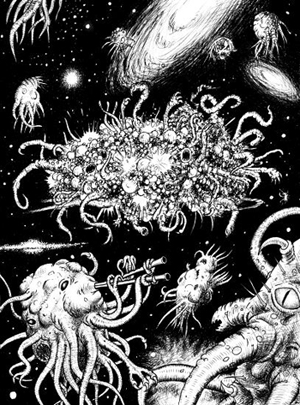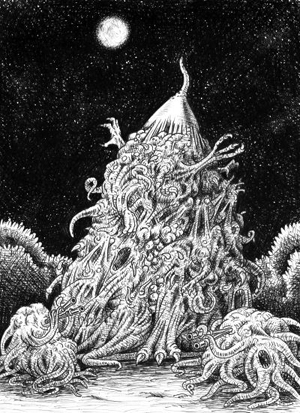
Your complimentary articles
You’ve read one of your four complimentary articles for this month.
You can read four articles free per month. To have complete access to the thousands of philosophy articles on this site, please
Articles
Evil From The Outside
Martin Jenkins considers alternative explanations of suffering, somewhere between traditional monotheism and new atheism.
Theodicy is the name theologians give to attempts to answer the following question. Why does a powerful and loving God permit evil and suffering? This has long been a problem in theology and philosophy. It has also been one of the arguments used by ‘fundamentalist’ atheists to deny the existence of a supreme being. (I distinguish fundamentalist atheists, who militantly assert and argue for the non-existence of God, from those more ‘gentle’ atheists, such as the French astronomer Laplace, whose attitude to God was simply, “I have no need of that hypothesis.”) Surely, the fundamentalist atheists argue, a loving God could not possibly permit suffering?
In making this argument, they are conceding to the believers, since it is the latter who assert that God is loving. There are alternative views of God. For example, might God simply be mad or bad? The horror writer H.P. Lovecraft wrote about “that last amorphous blight of nether-most confusion where bubbles and blasphemes at infinity’s centre the mindless daemon-sultan Azathoth” (The Dream-Quest of Unknown Kadath, 1943). In a similar vein, Charles Fort asked: “If there is a universal mind, must it be sane?” And A.E. Housman used the phrase “Whatever brute and blackguard made the world…” (Last Poems IX).
An ‘incompetency’ variation on this theme is offered by James Branch Cabell in his fantasy novel Jurgen (1919). At the end of the book the protagonist finds himself in the company of the supreme being, Koshchei the Deathless, and realises that, although omnipotent, Koshchei is not particularly intelligent. Koshchei himself admits his inadequacies:
“And I manage affairs as best I can, Jurgen. But they get in a fearful muddle sometimes. Eh, sirs, I have no competent assistants. I have to look out for everything, absolutely everything! And of course, while in a sort of way I am infallible, mistakes will occur every now and then in the actual working out of plans that in the abstract are right enough.”
More recently, Peter McCue argued in Fortean Times #376 that there might be a cosmic trickster at the back of everything. This trickster ensures that strange things happen which cannot be adequately investigated. And even supernatural believers have suggested trickster spirits, such as the Norse god Loki, or Satan as seen in the Book of Job.

The mindless daemon-sultan Azathoth © Dominique Signoret Creative Commons 3
This brings us to another problem with fundamentalist atheists: they are committed to denying monotheism. They never address the possibility that there may be multiple deities. It is left to polytheists, such as Homer in the Iliad, to suggest another approach to theodicy: that there might be several gods who just cannot agree amongst each other – in Homer’s case, over whether the Greeks or the Trojans are in the right. The gods take sides accordingly, and human suffering results from their disagreements.
Fundamentalist atheists also bypass the argument of dualists, such as Zoroastrians, that there are two supreme beings: an evil one and a good one. The Gnostic variant of this has the evil god make the material world, while the good god remains purely spiritual. This makes the material world essentially evil and so something to be escaped, with salvation lying in learning wisdom or gaining knowledge (gnosis) until one is spiritual enough to become one with the good god. Both atheists and monotheists have difficulty with this hypothesis.
So there are many concepts which the fundamentalist atheists have failed to address. They buy into the traditional monotheist’s implicit claim that the God they deny is not only loving, but also sane and efficient. They do not address these other possibilities I’ve mentioned:
• That there is a God, but he/she is barking mad (the Lovecraft/Fort hypothesis);
• That there is a loving God who is hopelessly inefficient (the Cabell hypothesis);
• That there is a God, but he/she is a malicious trickster (the Mccue hypothesis);
• That there are several gods with divergent opinions (the Homer hypothesis).
• There are good and evil beings who are equally powerful (the Zoroastrian hypothesis).
Any of these hypotheses would provide an explanation for how the universe is organised (or disorganised) which could be justified from an empirical observation of an untidy world in which good and evil co-exist. So it is possible to accept any of them as an alternative to atheism. This means that when the atheists argue from theodicy, they are not making an argument for the non-existence of a supreme being: the most that they can claim is that the supreme being, if he/she exists, does not possess some of the qualities which traditional monotheists claim he possesses. This doesn’t rule out the possibility of a supreme being who to our way of thinking would be morally unsatisfactory. Therefore, the argument for atheism from theodicy is logically unsound. The most that the atheists can say to believers is not, “There is no God” but “You may be mistaken about the nature of God (if he/she exists)”.

Nyarlathotep © Dominique Signoret Creative Commons 3
Implicitly, the fundamentalist atheists also accept the monotheist’s concept of a loving God as the basis of their argument against him. But what does either party mean by a ‘loving’ God?
Here psychology crosses paths with philosophy. In effect, when atheists say that a loving God would not have created a world full of suffering, what they mean is, “I would not have created the world full of suffering.” They are setting up their own concept of what a loving God must do, and by implication imposing their personal standard of morality as the moral standard against which to criticise a hypothetical supreme being.
At this point we must acknowledge that the monotheists have addressed the problem somewhat more effectively than this. Their God sent a Flood to destroy the human race because of its wickedness (see Genesis 6). So the believers live with attributing a moment of apparent petulance to the supreme being, but at least show him acting against evil in some way. The atheists, on the other hand, persist in demanding their understanding of absolute perfection for the God they do not believe in.
But what is this absolute perfection? It is living up to a moral standard established by the atheist. On what basis? we may ask. In fact, it is demanding that the supreme being ought to have organised the world according to the principles the atheist in question thinks that a loving God would have used – and since he did not, therefore he does not exist. (You may or may not share my feeling that the idea of Richard Dawkins as the supreme moral authority fills me with dread.)
However, there is in fact no logical path from ‘The world is not organised as I, if I were God, would have organised it’ to ‘God does not exist’. Any attempt to create such a path implies that a human being can imagine what it would be like to be God – and as Thomas Nagel pointed out, we can’t even imagine what it’s like to be a bat, never mind God. Fundamentalist atheists, just like the believers, set out a description of what God is, or ought to be (in practice they accept something like the believers’ version), and then assert that because he does not fulfil that description, he does not exist.
This is the reverse of Anselm’s ontological argument. In the eleventh century Anselm argued that when we conceive of God we by definition conceive of a perfect being, and perfection must include existence. The theodicy atheists paint a picture of an imperfect God and then argue that an imperfect God cannot exist. Instead, like many believers, I find myself obliged to be an atheist, in the sense that I do not believe in the God that Richard Dawkins disbelieves in.
I have not attempted to answer the question of theodicy, or to offer an argument for the existence of a supreme being. My only intention here has been to draw attention to the muddled, illogical thinking at play when fundamentalist atheists attempt to argue from the problem of evil to the non-existence of God.
© Martin Jenkins 2022
The late Martin Jenkins was a Quaker, a retired community worker, and a frequent contributor to Philosophy Now.









